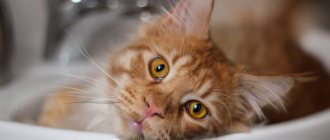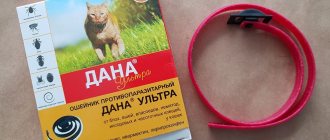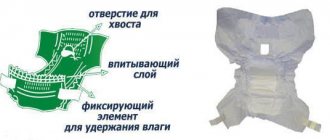8817Pavel
The appearance of a small kitten in the house is, of course, a joyful event. Now he will wait for the owner to arrive, fall asleep on his lap, purr in his palms and ask to play. He comes to the house to live in it and please the person. And a person must prepare a home for this defenseless baby so that he will be happy in it. Here are detailed tips on what a kitten needs and how to choose it.
First of all, the kitten will need a place where it will sleep, eat and go to the toilet. We must remember that he is a living being with his own needs.
© shutterstock
For growth and development, he must eat well and drink clean water. Therefore, it is better to immediately buy two different bowls - a deeper one for water, a flat one for food. Best suited :
- glass,
- earthenware,
- enameled.
Bacteria grow very quickly in plastic ones, which lead to the appearance of untidy black marks on the face. If buying a separate cat bowl is expensive, then an old small salad bowl for water and a saucer for food will do just fine.
By the way, food should be bought in bags with the kitten’s age already indicated. It contains everything a growing body needs and has a long shelf life. It’s better to immediately, before the kitten arrives, buy several different bags, especially since their price is modest - about 10 rubles . Over time, your pet will develop taste preferences. Bottled drinking water is suitable. It needs to be changed as often as possible, avoiding stagnation, depending on the contamination, 2-3 times a day.
Tray
To live comfortably for a cat in an apartment, you need to find a place for a toilet. Today in stores you can choose cat litter by color, depth and size. When choosing a toilet, you need to remember that the kitten is small and cannot jump high. A shallow pan or tray with a recess works best. You shouldn’t buy something expensive or very cool, because in 3-4 months the cat will grow up, get stronger and need a new toilet. The toilet itself needs to be changed twice a day and washed with cleaning products once a week, after washing it should be rinsed and dried well.
© shutterstock
It is also better to resolve the issue with the filler in advance and purchase one that is already known to the animal, such as the owner had. If this brand is too expensive and you don’t like it, then you need to gradually get used to the new filler. Replacing them with an increasing amount of the contents of the tray.
Toiletries
This category includes the tray, filler and hygiene products.
The tray should be easy to use. The easier it is for a kitten to use the litter box, the more willing he will be to go in it. You need to place the tray in a quiet place where no one will disturb the kitten when it is busy there.
It’s better to start by buying the same filler The usual filler will not cause additional stress for the pet; he will know exactly what to do. When the kitten gets used to its new home, the litter can be gradually changed to another.
A scoop for cleaning the tray is often sold along with the tray.
A hygiene product for the tray is needed to regularly wash the tray before completely changing the filler. Give preference to products without strong odors. Due to the strong unpleasant smell of chemicals, the kitten may stop going to the litter box.
A remedy for the smell of urine may be needed at first, when the kitten has not yet remembered where its litter box is located. Special products can be purchased at a pet store.
Carrying
A carrying bag is not a luxury, but an opportunity to transport an animal in comfort. After all, any journey is stressful for the animal, and even more so if it is held in your arms, frightened by passers-by and dogs. It may break out, damage its delicate bones, or simply become very frightened.
Carry bags have a number of undeniable advantages:
- They have handles, making them easy to carry.
- The walls of the bags are not transparent, which gives the cat a feeling of protection and the opportunity to hide or fall asleep.
- Plastic bags will protect the animal from squeezing and accidental impacts.
- Convenient doors will allow you to carefully remove the cat without causing any inconvenience to it.
- Transparent windows allow you to monitor the condition.
© shutterstock
Food and bowls
The kitten's food should be recommended by the breeder. At first, it is better to feed your baby his usual food, so he will not experience stress from changing food. When the kitten adapts to a new place, you can gradually change its diet. Especially for kittens, SUPERPET offers the Minced meat line: the line is designed for kittens up to two months and will help animals easily get used to a healthy diet from childhood.
Bowls should be such that it is easy for the baby to eat and drink from them. You can purchase smaller bowls for your kitten and later replace them with larger bowls. For water, you can purchase a special drinking fountain for cats. Many pets prefer to drink running water.
Treats are needed not only to pamper your pet. Treats are useful for raising a kitten - they can reinforce good behavior and be used during training. We recommend giving preference to natural treats without artificial ingredients.
scratching post
If you don’t want to cut your nails or it’s not possible, then a specially equipped play corner will come to the rescue. You can buy it in a store, order it from a craftsman, or even make it yourself using a model from the Internet. In any case, it should be made from natural parts - wood, hemp, burlap. The parts are fastened with silicone glue or large nails with a decorative cap.
© shutterstock
Veterinarians advise paying attention to:
- No smell, there shouldn't be any. This will repel the kitten and become a source of allergies for the person.
- Strength. All parts must hold tightly, the edges are firmly sewn, and the shelves and pipes must withstand the pressure of an adult’s hand.
- Safety. All surfaces should be carefully smoothed with your palms to look for loose nails, staples, etc. If there is a piercing or scratching sensation, it will definitely damage either the mouth or the paw.
- Dimensions. The house should not be tiny so that the kitten does not get stuck or get bored.
Educational toys
A kitten is the same playful child. He has a high need for games. He is attracted to everything that moves and makes sounds. For the appearance of hunting behavior, mice, balls, anything tied, swinging on a stick, anything that can be caught on are suitable. It is not necessary to buy toys for kittens; it is advisable to replace them with different objects if you “turn on” your imagination. It is important to remember that trinkets must be safe. If a pet manages to bite off, tear off, fragment and swallow something, the consequences will turn into a big problem, including surgical intervention.
Pet stores offer edible toys enriched with vitamins.
House or place to sleep
It is not always necessary to arrange a personal house for a kitten so that it feels comfortable. Sometimes a warm blanket on a chair or an old knitted sweater is enough. The main thing is that it is dry, warm and safe.
But still, so that the cat later knows its place in which it can sleep, it is better to buy a house. This will solve the problem of falling asleep on clean or ironed items or wool on them.
The house for the kitten to appear and live in should be chosen to be soft, made of natural fabrics in soothing colors. You definitely need an entrance, without curtains or doors, to ventilate it. The place to sleep should be regularly fried in the sun and washed.
What else?
Before the kitten arrives at its new home, evaluate how safe it is for your pet. Consider adding cat netting to your windows. Hide wires and cables to prevent the kitten from chewing them.
If you plan to walk your kitten, you will need a harness and leash. If you wish, you can buy a collar with a tag for walking, in case the kitten gets lost.
Author of the article
Yulia Antonovskaya
Lyricist
Rate this article
- 5
- 4
- 3
- 2
- 1
0
votes, average:
0 out of 5
Care products
Any animal must be looked after - its fur must be combed and washed. Special combs are sold - combs that help prevent hair from getting into the stomach when licking. You can comb your animal every day. He'll love it.
Shampoos for animals have a special composition that additionally helps get rid of parasites and improve the health of the skin and coat.
© shutterstock
How to determine if you are ready to buy a kitten
Before making a purchase, answer these questions:
- Does everyone in the family want to have a cat? Talk to your household, warn them of your intention, listen to possible concerns and wishes. Having a pet is a responsibility. Its maintenance will require the participation of all family members. It is important that everyone is willing to accept and care for the animal.
- Are your family members allergic to cats? It is important to clarify this before an animal appears in the house.
- If you have other pets, will they be able to accept a new pet? Some dogs perceive small kittens as prey. The baby himself, with his irrepressible energy and curiosity, can irritate sedate adult cats. And it is dangerous to leave rodents and birds alone with a kitten.
- Do you have enough money for maintenance? It is important to analyze your budget to see if it is enough to support a new pet. Consider the cat's lifespan; the budget should be enough for the long term.
- Do you have enough time to devote to your kitten? Evaluate your schedule. Analyze whether your family has the opportunity not to leave the baby alone for a long time. Kittens need to be fed regularly, their tray changed, and played with.
- Will your children be able to get along with their new pet? To ensure a successful life together for your little family members and your animal, choose a pet from the best cat breeds for children.
How to choose a kitten
Buying a kitten is not just about choosing the cutest baby.
You must decide on the breed and gender you want. The animal must suit your temperament, be healthy, socialized, and have basic skills (eat on its own, go to the litter box).
If you choose a purebred pet, it is important that he and his parents have all the supporting documents and the results of tests for hereditary diseases.
- Do not buy based on the photo based on the seller's characteristics.
- Get to know the candidates for purchase in advance, see in what conditions they are kept.
- Look at the parents and other babies from the litter, compare them.
- Do not hesitate to ask the seller, demand documents for the kitten and parents’ passports, and the results of genetic tests.
- Check the physical and mental health of the chosen animal before purchasing.
- Personally evaluate the conditions of detention and care.
Remember, you are choosing a pet for yourself not for one day, but for the next 15-20 years.
Video
What to look for when buying a kitten
In order not to make a mistake in choosing a new pet, do not rush to take the baby home as soon as you see him, even if you really liked him. Visit him at least twice to observe him, his mother, and siblings.
You need to make sure that the kitten and its littermates are happy and well cared for. If the animals look unhappy or tortured, or you are not allowed to see the baby in his usual environment, refuse the purchase.
What else to pay attention to:
- Meet the baby's mother. She should look relaxed, happy, not afraid of people, and feel comfortable in their presence. The influence of the mother is of great importance in shaping the character of the kitten.
- Assess the conditions of detention. Inspect the room where the cat and her children live. It should be clean, warm, without any unpleasant odors. The presence of cells, dirt, and strong odors should alert you. Ask the seller to show you the bowls and litter box the animals use. They must be clean. This indicates good care of the animals.
- Find out from the breeder the age of the animal, evaluate whether the appearance of the kitten corresponds to this age. You cannot take an animal younger than 2-3 months.
- Check the gender of the kitten. You must make sure that the baby belongs to the gender that you want to have.
- Ask to see the kitten's documents, documents of its mother and father. You must make sure that the kitten belongs to the cat breed that the seller told you.
- Ask if the kitten has been checked by a veterinarian, if it has any vaccinations, has been treated for parasites, or has genetic testing done. A conscientious breeder will show you a veterinary passport, which reflects all this information. At the age of 2-3 months the first vaccination should be given.
- Ask to see the mother's veterinary passport; it should also contain information about vaccinations, anti-parasitic treatment and genetic test results.
- Ask about diet. Find out what the seller fed you. Let the owner show the food he fed the mother and offspring and talk about the complementary foods introduced. Consider whether you can feed this food, find out about alternative brands.
- Ask if the cat is accustomed to the tray and scratching post. Visit the seller several times to see for yourself.
- Check socialization. Take the kitten in your arms and play with it a little. He should not be afraid, hiss, try to escape from his hands, or bend in an “arc.” This behavior is not typical of healthy, socially adapted kittens.
- Ask the seller if the kitten has a nickname, try calling him by name. Smart kids at this age already respond to their name. If the breeder did not give a nickname, you can choose your own from our list of nicknames.
- Examine the animal and assess its health. Read on to find out how to do this.
How to choose the right healthy kitten
A healthy kitten is a guarantee that it will cause you fewer problems. Responsible sellers will not hide from you whether the baby has health problems of a genetic or non-hereditary nature.
You should be able to examine the kitten before purchasing and take it to the vet if you have any doubts about its health. This will help resolve issues with the seller if any health problems are discovered in the candidate for purchase.
How to check your kitten's health
- Examine the animal's eyes. The view must be clear. Eyes are clear, without cloudiness, redness, discharge or tears.
- Look inside the cat's ears. They should be clean, without black crusts, redness, or dirty sulfur. There should be no unpleasant odor from the ears. Dirty ears indicate illness and poor care.
- Look at the nose. It should be clean, without ulcers or discharge.
- The kitten's coat should be clean, free of dandruff, traces of parasites, not matted, smooth and shiny. It should not have an unpleasant odor.
- Look under the tail. It should be clean, there should be no signs of diarrhea or worms.
- Listen to your breathing. There should be no characteristic “whistle”.
- The kitten should not sneeze constantly - this is a sign of illness.
- Examine the skin. There should be no wounds, ulcers or dried crusts on the body.
- Estimate the weight. The kitten should not be skinny or overly plump. An overly swollen belly may indicate the presence of worms.
- Look into your mouth. There should be no unpleasant odor coming from the mouth. The number of teeth should correspond to the age of the animal. They must be clean.
- Healthy kittens are cheerful and playful, without apathy, aggression or depression.
Small scratches on the neck should not bother you - these are marks from the mother's teeth.
Video











